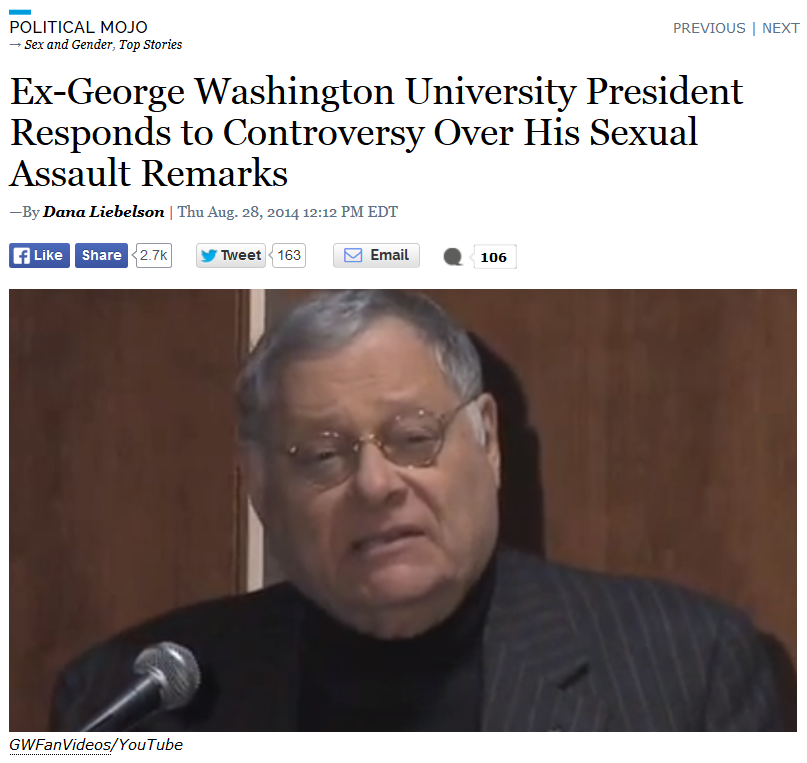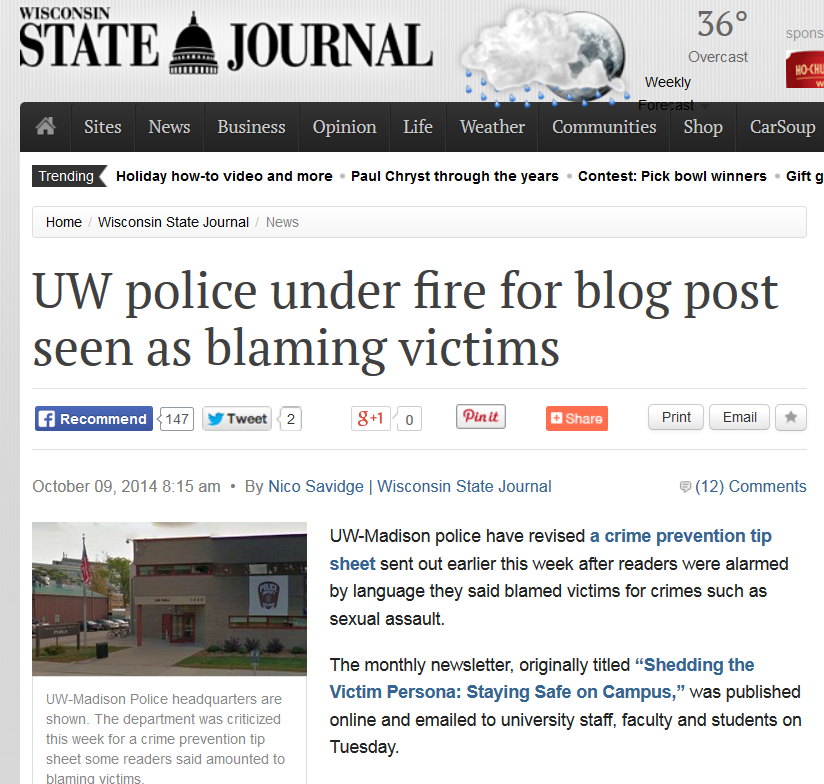The Line Between Rape Prevention Advice And Victim Blaming
Many university presidents have found themselves in hot water recently for dispensing what they thought of as “common sense” campus safety advice to students. Seemingly innocuous pieces of advice, such as “be careful how much you drink,” are increasingly being perceived as “victim blaming.”
I’m not an expert in this area, so in an effort to learn more, I spoke with Katherine Hull Fliflet, the vice president of communications for RAINN, the Rape, Abuse & Incest National Network.
First, you’ll find several examples below of university heads who have become embroiled in controversy due to their comments on sexual assault.
George Washington University
Last summer, former George Washington University president Stephen Tractenberg was criticized by some students and blogs for saying this:
“Without making the victims responsible for what happens, one of the groups that have to be trained not to drink in excess are women. They need to be in a position to punch the guys in the nose if they misbehave.”
He later defended his comments by saying:
“You need to educate the men but that doesn’t mean you don’t want to arm your women with the ability to defend themselves…It doesn’t shift the blame, ultimately, but you have to be wise and street smart.”
Lincoln University
The president of Pennsylvania’s Lincoln University, Robert Jennings, resigned in November after saying the following, as summarized by The Huffington Post:
“Men treat you, treat women, the way women allow us to treat them. We will use you up if you allow us to use you up,” he said, adding that men will “marry the girl with the long dress on.”
Eckerd College
Donald Eastman, president of Florida’s Eckerd College, wrote the following in an open letter to students and faculty in November:
“You know that these incidents are almost always preceded by consumption, often heavy consumption, of alcohol, often by everyone involved in them…No one’s culture or character or understanding is improved by casual sex.”
University of Wisconsin-Madison Police Department
In an October crime prevention tip sheet, the UW-Madison police department wrote the following, according to the Wisconsin State Journal:
“If you present yourself as easy prey, then expect to attract some wolves…If you make yourself a hard target, one who is aware of their surroundings, you take away two elements of a crime: desirability and opportunity.”
The department quickly revised the tip sheet after being accused of victim blaming.
What Should University Leaders Say?
First, one thing appears rather obvious in some of the examples above: Any time safety advice is couched in the language of “moral” sexual behavior, it crosses into being broadly perceived as unacceptable victim blaming.
But what about the question of educating students about the potential perils of alcohol abuse as it relates to sexual assault? Wouldn’t it be wise for university presidents to address that issue? “It’s too narrow,” says Ms. Hull Fliflet of RAINN, who argues that putting that much emphasis on a single risk factor diminishes the broader conversation.
“It’s more effective to speak to the student body as a whole about risk reduction for reducing crime on campus in terms of friends having roles to play as opposed to directing the advice to an individual student.”
University leaders can use a RAINN fact sheet called “protecting your friends” to educate students about the need to keep an eye out for their peers in social situations, step in and create a distraction when “a situation doesn’t feel right,” and enlist others as “reinforcements.” As examples, a group of female students can keep an eye on one another, but male students can also look out to make sure their male peers aren’t engaging in potentially risky behavior.
Another suggestion: Hull Fliflet says it’s critical to communicate this advice in a gender-neutral manner since victims aren’t always women. She also wonders why, as in so many of the examples above, authorities focus on “don’t drink” as their key piece of advice instead of “don’t rape.” More broadly, she argues that university presidents must communicate that they take these issues seriously—and bolster their policies to match their rhetoric.
With so many leaders being singed by touching this hot topic in the wrong way, I suspect that many university heads would rather stay away from this issue altogether. Hull Fliflet says that’s the wrong solution. “This is a real opportunity for a college president to make it clear that all reports of sexual assault will be taken seriously and investigated thoroughly,” she says. “They just need to be honest that their school isn’t immune.”
A Few Final Thoughts
University leaders who fail to pay attention to these sensitivities (or go well beyond them, as in some of the examples above) must learn about and remain aware of the potential landmines. My suggestion? Before speaking out on these topics, consult with outside experts, make sure you understand where sensitivities exist, and work collaboratively to develop a set of public safety suggestions that achieve your goals without repelling the very people they’re intended to help.
Please leave your thoughts below. I look forward to learning from you.
h/t Huffington Post





My three children — two young women and one young man — are in university right now. They have a good friend who was sexually assaulted at her university (a different one than they attend.) The way the administration handled it was deplorable. They “investigated” and cleared the young man, even though he had assaulted four other students. He is wealthy and his family may well be giving a great deal of money to the university… She, the complainant, is not allowed to speak publicly about the issue.
As a result of this, my view has changed radically. I think it’s completely unacceptable for university presidents to give students any advice on how to “protect” themselves. Instead, they should focus on STOPPING the assaults. This will take time, money and education.
Did you know that 100,000 rapes are anticipated on US college campuses in the next year? I find that mind-numbing and horrifying. That stat comes from the documentary The Hunting Ground, by Kirby Dick. Dealing with this horror should be the TOP priority for university presidents right now.